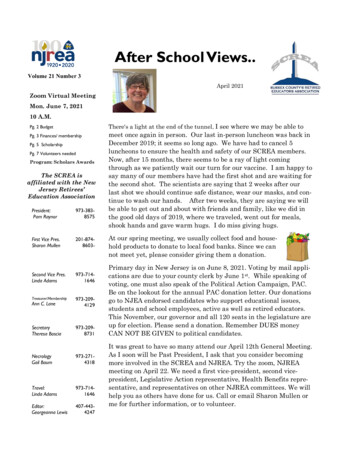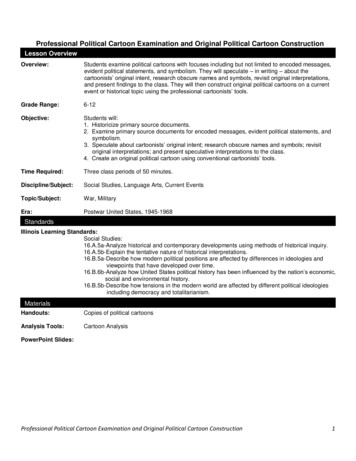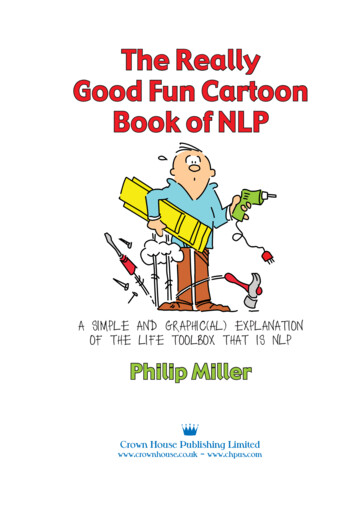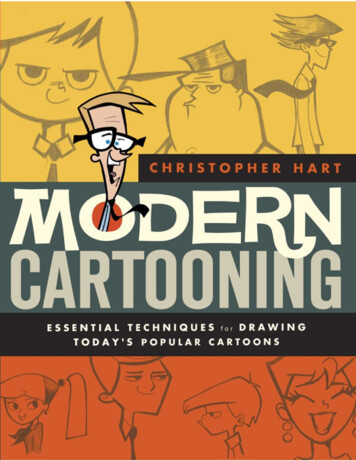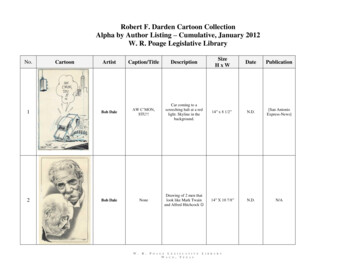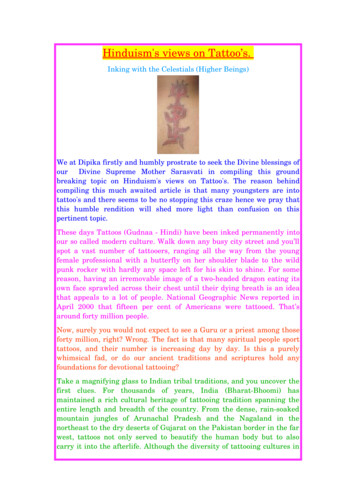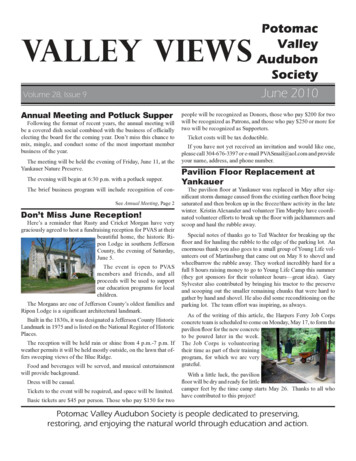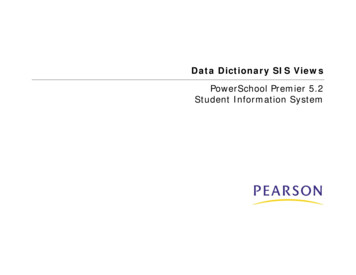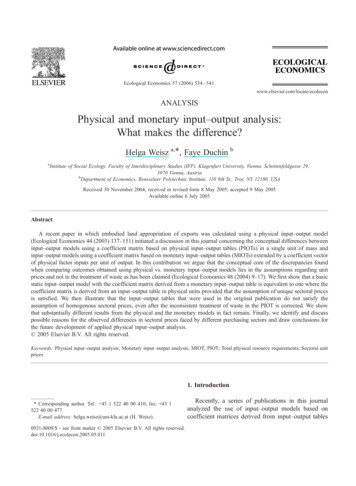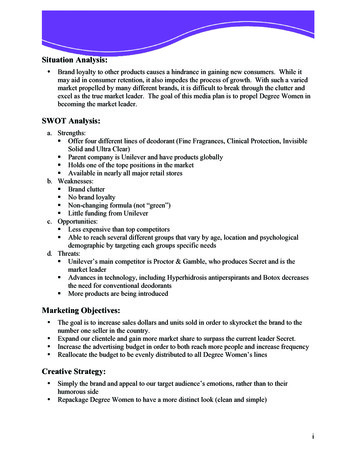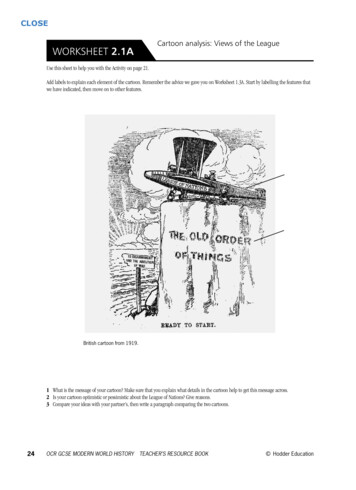
Transcription
02-p25599-OCR MWH-Chapter 02-ccp:978034098667724/6/0909:21Page 24CLOSEWORKSHEET 2.1ACartoon analysis: Views of the LeagueUse this sheet to help you with the Activity on page 21.Add labels to explain each element of the cartoon. Remember the advice we gave you on Worksheet 1.3A. Start by labelling the features thatwe have indicated, then move on to other features.British cartoon from 1919.1 What is the message of your cartoon? Make sure that you explain what details in the cartoon help to get this message across.2 Is your cartoon optimistic or pessimistic about the League of Nations? Give reasons.3 Compare your ideas with your partner’s, then write a paragraph comparing the two cartoons.24OCR GCSE MODERN WORLD HISTORY TEACHER’S RESOURCE BOOK Hodder Education
02-p25599-OCR MWH-Chapter 02-ccp:978034098667724/6/0909:21Page 25CLOSEWORKSHEET 2.1A (continued)Use this sheet to help you with the Activity on page 21.Add labels to explain each element of the cartoon. Remember the advice we gave you on Worksheet 1.3A. Start by labelling the features thatwe have indicated, then move on to other features.Cartoon from the magazine Punch, March 1919.1 What is the message of your cartoon? Make sure that you explain what details in the cartoon help to get this message across.2 Is your cartoon optimistic or pessimistic about the League of Nations? Give reasons.3 Compare your ideas with your partner’s, then write a paragraph comparing the two cartoons. Hodder EducationOCR GCSE MODERN WORLD HISTORY TEACHER’S RESOURCE BOOK25
02-p25599-OCR MWH-Chapter 02-ccp:978034098667724/6/0909:21Page 26CLOSEWORKSHEET 2.1BThe League: success or failure?Use this sheet to help you with question 4 of the Activity on page 21.Key successThe same question is repeated on later pages. Each time: failure1 Note the date and events affecting the League at that stage.2 Decide what the mix is between success and failure.3 Divide your pie chart accordingly. Use different colours for success and failure. Complete the key to showthe meaning of your colours.4 Use the space beside each chart to note reasons for your predictions. If you want to write more explanation, do so on the back of this sheet.26p. 21 predictionp. 23 predictionp. 27 predictionp. 29 predictionp. 31 predictionp. 33 predictionp. 35 predictionp. 37 predictionp. 39 predictionp. 42 predictionOCR GCSE MODERN WORLD HISTORY TEACHER’S RESOURCE BOOK Hodder Education
Hodder EducationOthers were worried about the economic cost of joining theLeague. They thought it would be as if the USA were signing ablank cheque. The USA would promise to solve all internationalproblems regardless of the cost. Business leaders in particularargued that the USA had become a powerful country byisolationism – staying out of European affairs. The USA shouldcontinue to mind its own business.The League was inextricably linked to the Treaty of Versailles.Wilson had insisted that all the signatories to the Treaty shouldjoin the League. The League was also supposed to enforcethe Treaty. Yet some Americans hated the Treaty itself. ManyAmericans were recent immigrants. There were millions ofGerman immigrants who had never approved of the USA joiningthe war against Germany. They certainly did not want the USAto prop up the League as it squeezed reparation payments outof Germany. They wanted the USA to have no part in it.Use this sheet to help you with question 1 on page 22.WORKSHEET 2.2Shouldthe USAjoin theLeague?Other Americans opposed the League because they wereanti-British or anti-French. They thought the League would beunder the control of Britain and France. Why should the USAget dragged into fighting for Britain's Empire? Americansbelieved in freedom. They opposed the whole idea of coloniesand empires. Surely the USA could not agree to safeguard allthe colonial possessions of Britain and France!To many Americans the plans for the League of Nationssuggested the USA was promising to send its troops to settleevery little conflict around the world. Americans had beenappalled at the carnage of the First World War. They wantedthe USA to stay out of such disputes.Why did the USA not join the League of Nations?02-p25599-OCR MWH-Chapter 02-ccp:978034098667724/6/0909:21Page 27CLOSEOCR GCSE MODERN WORLD HISTORY TEACHER’S RESOURCE BOOK27
02-p25599-OCR MWH-Chapter 02-ccp:978034098667724/6/0909:21Page 28CLOSEWORKSHEET 2.3Were there weaknesses in the League’sorganisation?Use this sheet to help you with the Focus Task on page 27.THE OPTIMISTPeace at last! The Leagueof Nations will keep large andsmall nations secureI’m not sure. It might look impressive but I think there are weaknessesin the LeagueTHE PESSIMISTChoose either the optimist or the pessimist and explain, under the headings provided below, why your diplomat feels the way he does. Forexample, the optimist feels confident about the League helping security. Why does the League’s membership make him feel that way?28Membership of the LeagueWhat the main bodies within theLeague can doHow each body will make decisionsHow the League will enforce its decisionsOCR GCSE MODERN WORLD HISTORY TEACHER’S RESOURCE BOOK Hodder Education
Hodder EducationBulgaria, 1925Reason for score09:21Corfu, 1923Score for League(-5 to 5)24/6/09Aaland Islands, 1921Upper Silesia, 1921Vilna, 1920Dispute/incidentThe League in action – disputes in the 1920sUse this sheet to help you with the Focus Task on page 29.WORKSHEET 2.4Did weaknesses in the League’s organisation make failure inevitable?02-p25599-OCR MWH-Chapter 02-ccp:9780340986677Page 29CLOSEOCR GCSE MODERN WORLD HISTORY TEACHER’S RESOURCE BOOK29
30Evidence againstOCR GCSE MODERN WORLD HISTORY TEACHER’S RESOURCE BOOKWrite a paragraph to explain your view.09:21Looking at the evidence you have compiled, do you think these criticisms of the League were valid? If so, did they make failure inevitable?Evidence for24/6/09That without theUSA it would bepowerlessThat memberswould act in theirown interestsThat it would beslow to actCriticismUse this table to analyse the Bulgarian and Corfu crises of the 1920s for the Focus Task on page 30. Use another table to analyse the Manchurian and Abyssinian crises of the 1930s on pages 36–43.WORKSHEET 2.4 (continued)02-p25599-OCR MWH-Chapter 02-ccp:9780340986677Page 30CLOSE Hodder Education
02-p25599-OCR MWH-Chapter 02-ccp:978034098667724/6/0909:21Page 31CLOSEHow successful was the League in the 1920s?WORKSHEET 2.5Use this sheet to help you to answer question 4 of the Focus Task on page 33.Which of the following statements do you most agree with? Circle one of the numbers.Disagreestrongly1 The League of Nations was a great force forpeace in the 1920s.2 Events of the 1920s showed just how weak theLeague really was.3 The League’s successes in the 1920s weresmall-scale, its failures had a higher profile.Agreestrongly012345012345012345Use this writing frame to explain your scores.Paragraph 1: My view of statement 1 is I accept/reject this statement because Paragraph 2: My view of statement 2 is I accept/reject this statement because Paragraph 3: My view of statement 3 is I accept/reject this statement because Paragraph 4: Overall, I am most in agreement with statement –––– because Hodder EducationOCR GCSE MODERN WORLD HISTORY TEACHER’S RESOURCE BOOK31
02-p25599-OCR MWH-Chapter 02-ccp:978034098667724/6/0909:21Page 32CLOSEHow did the Depression make the work of theLeague harder?WORKSHEET 2.6Use this sheet to help you with the Focus Task on page 35.1 Draw lines to connect the following statements with the country where each one might have been said during the Depression.2 Alongside each speech bubble explain why you think this statement might worry the League of Nations or make the League’s work moredifficult.We need tough leaders who willnot be pushed around by theLeague of Nations or the USA.I have not workedsince last year.GermanyI will vote for anyone whocan get the country back towork.We should ban all foreigngoods. That will protect thejobs of our workers.32USAItalyJapanReparations havecaused this mess.The bank has closed.We’ve lost everything!If we had our own empire we wouldhave the resources we need.Economic depressions would notdamage us so much.OCR GCSE MODERN WORLD HISTORY TEACHER’S RESOURCE BOOK Hodder Education
Hodder EducationDate:Date:SummaryMain cause(s)Action by LeagueEffects on LeagueSummaryMain cause(s)Action by LeagueEffects on League09:21ABYSSINIAN CRISISEffects on LeagueEffects on League24/6/09FAILURE OF DISARMAMENTAction by LeagueAction by LeagueMain cause(s)Date:Main cause(s)MANCHURIAN CRISISSummaryDate:SummaryDEPRESSIONUse this sheet to help you to make revision notes on pages 34–43. Remember that you are aiming for a summary, so be brief.WORKSHEET 2.7The failure of the League in the 1930s: revision notes02-p25599-OCR MWH-Chapter 02-ccp:9780340986677Page 33CLOSEOCR GCSE MODERN WORLD HISTORY TEACHER’S RESOURCE BOOK33
02-p25599-OCR MWH-Chapter 02-ccp:978034098667724/6/0909:21Page 34CLOSEWORKSHEET 2.8Why did the League of Nations fail in the1930s?Use this sheet to record your answers to the Focus Task on page 44.In Manchuria they In Manchuria, thiswas a problem because In Abyssinia, they In Abyssinia,the USA French and Britishself-interest – they looked aftertheir own interests rather thanthe League’s.Absent powers – keycountries, particularly the USA,were not in the League.FAFailure ofthe LeagueIn Manchuria, In Abyssinia, ReReaching decisions tooslowly – the Leaguetook ages to act.IIneffective sanctions –sanctions either weren’t usedor didn’t work.In Abyssinia, In Manchuria, UUnfair treaty – theLeague’s job was to enforcetreaties that some membersthought were unfair.LLack of armed forces– the League had no troopsof its own.See Chapter 3.In Manchuria, theLeague could not sendtroops there as it wasimpossible to reach.34OCR GCSE MODERN WORLD HISTORY TEACHER’S RESOURCE BOOKIn Abyssinia, Britishand French forces could haveacted on behalf of the League,but the British and Frenchgovernments refused. Hodder Education
Why did the League of Nations fail in the 1930s? Failure of the League Absent powers – key countries, particularly the USA, were not in the League. Ineffective sanctions – sanctions either weren’t used or didn’t work. Lack of armed forces – the League had no troops of
